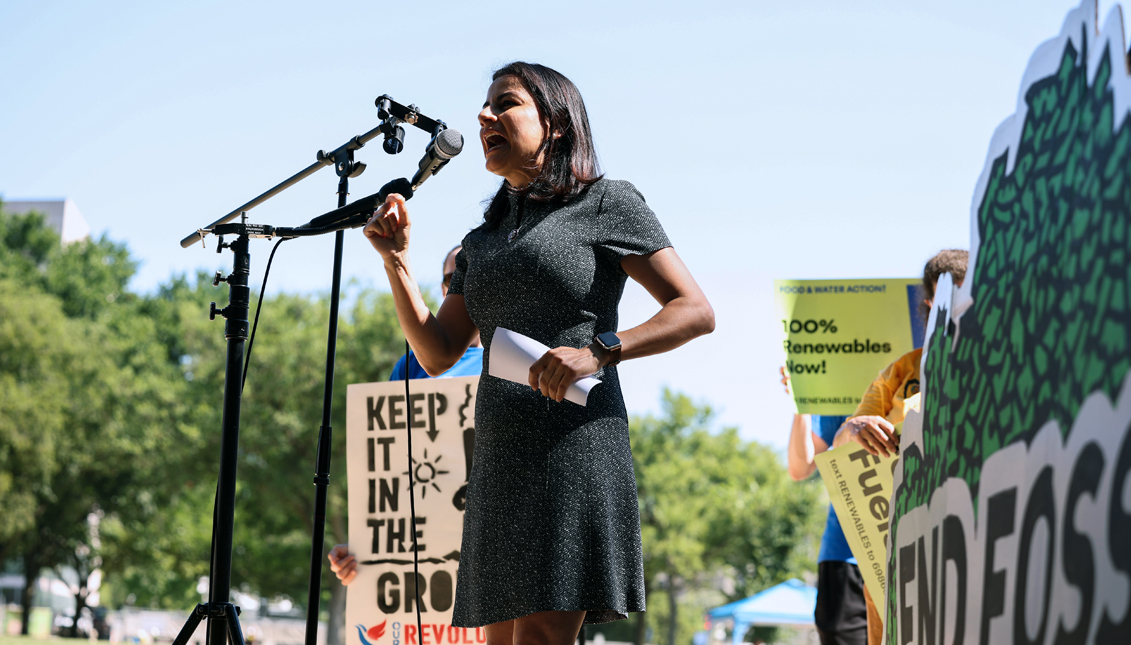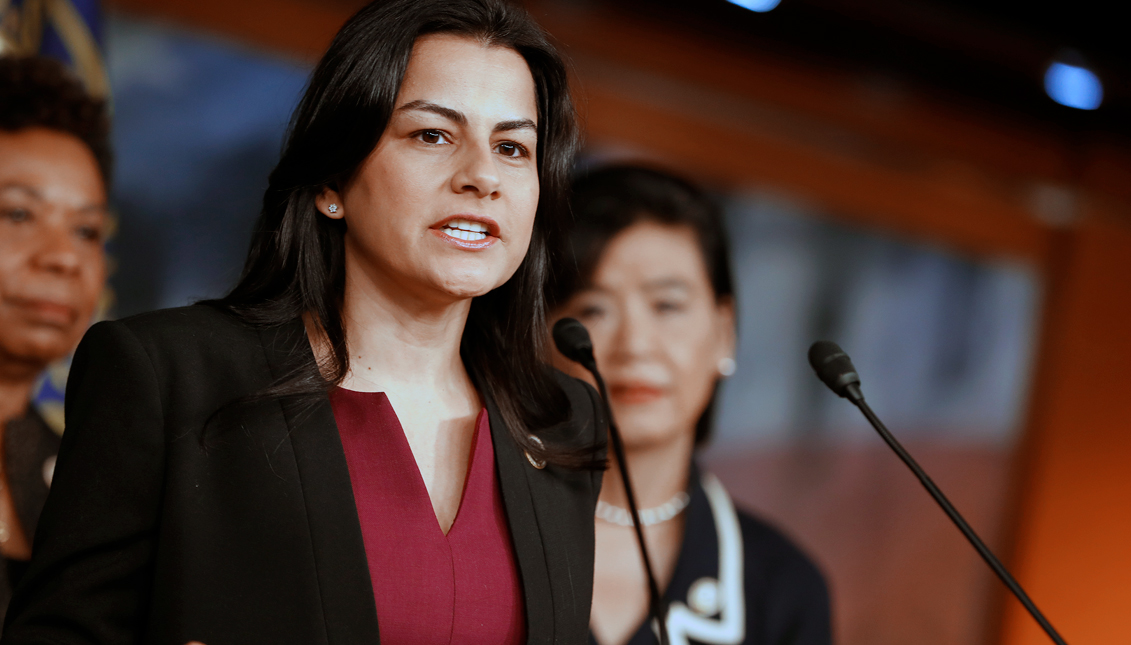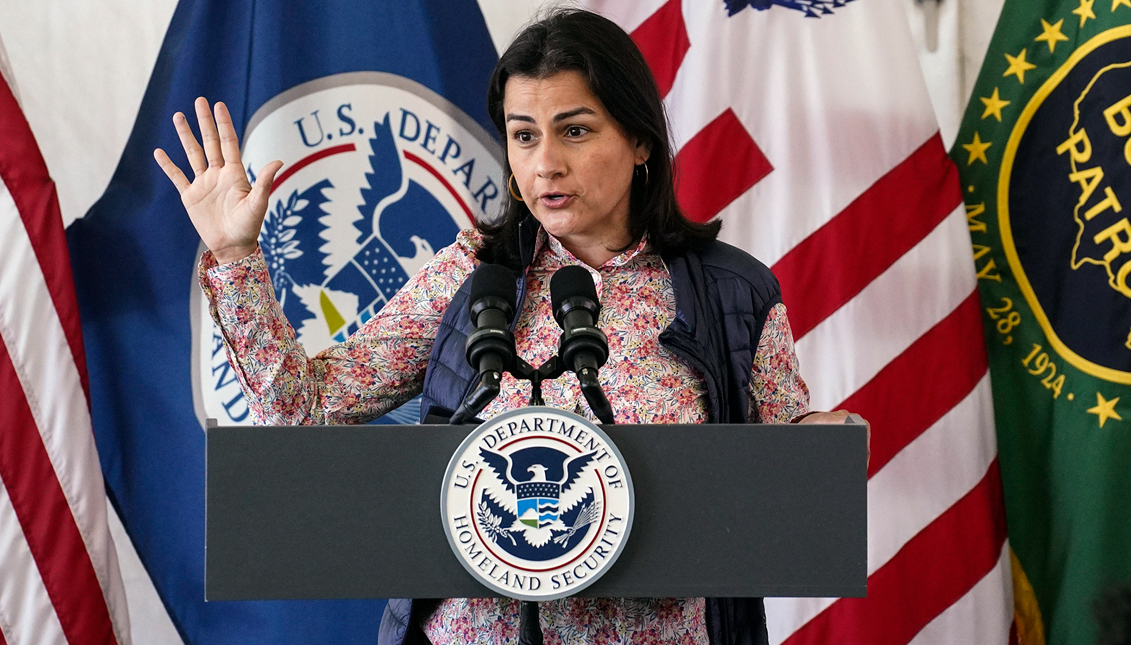
California’s leader on climate justice
Los Angeles-born Rep. Nanette Barragán leads the Hispanic Caucus Climate Change Task Force.
Like so many people growing up in a metropolitan area, Rep. Nanette Barragán didn’t know of the environmental hazards until much later in her life. She grew up in Harbor City, California in Los Angeles, a community boxed-in by two freeways on each side, and the Pacific Coast Highway cutting through its center.
“When I was a kid I had no idea that being near a freeway was actually bad because of the air pollution, and from the cars and the trucks and the diesel-burning fuel,” she said.
Barragán said she later learned the reason why she, and other family members had allergies and respiratory illnesses, was because of the air pollution, trucks, and refineries.
“In other places, neighbors had higher cancer rates than we had seen before, and so growing up I didn’t understand it, but I saw the impacts from it. And so now, the district I represent is 90% Latino, and Black and it’s the same situation, right? Because it’s the same place,” she said.
In the years since her childhood, the air quality has improved slightly in Los Angeles, but at the same time, truck traffic has increased on the myriad of freeways meandering through the city.
“There’s more cars and more trucks… and all of that traffic is going from downtown and from the Inland Empire to the ports,” Barragán said, referring to the port of Los Angeles. “And so we do see the impacts.”
Now in Congress, since she was elected to serve California’s 44th district in 2015, Barragán tackled the climate crisis in ways that would help her district first, which includes Compton and South Gate LA. But these initiatives would also serve the whole nation if implemented.
“The goal of my initiatives is to reduce pollution, especially for communities that suffer the worst environmental injustices. And that’s our district,” said Barragán

Rep. Barragán has a number of climate-focused initiatives that have been introduced in Congress.
The Climate Smart Ports Act, for example, is intended to help clean up the air and air pollution for communities living near ports by investing in zero-emissions technology. If implemented, it would affect the 40% of Americans that live within three miles of a port.
More often than not, these are Black communities and communities of color.
“I’ve been in these areas and a lot of them are immigrants,” Barragán said. “People who are not going to speak up because of either their status, or they were raised to stay quiet.”
Her Climate Justice Grants Act would similarly help local communities, by helping them undertake community climate mitigation and adaptation projects by applying for funding. Barragán’s microgrid bill, the Energy Resilient Communities Act, would also help local communities impacted by extreme weather events.
“So that if the power goes out, at least you’ll be able to have smaller grids where you can keep things like, the public hospital open and the fire station open and the library open,” she said.
We’re also living at a time when communities are constantly reeling from severe weather events across the country. From California’s relentless wildfires each year, the “Texas Freeze” at the start of 2020, to record hurricane seasons with each passing year.
Barragán recalled how the impacts felt from wildfires in California varied depending on financial status. Wealthier communities were able to pack up and stay in a hotel for as long as they needed to.
“People in economically disadvantaged communities can’t do that,” she said.
In some cases, Barragán said that climate-focused bills need incentives. Such a bill provides rebates to fleet owners that install electric vehicle charging stations for their electric vehicles.
“When you’re looking to see where these heavy duty vehicles are going through, it’s communities of color,” she said. “So this was a bill that we did say, ‘what incentive can we provide ... so that there’s no longer an excuse for there not being enough infrastructure.”
The same goes for green spaces, which Barragán also has a bill for.
The same goes for green spaces, which Barragán also has a bill for.
“There’s such a disparity of green space in communities of color versus more wealthy communities, and you can just look at places like Malibu, versus places like our district. The numbers are pretty steep,” she said.

In March 2021, Barragán continued her climate efforts in Congress as the new Chair of the Congressional Hispanic Caucus’ Climate Change Task Force.
The task force is new, and was created so Latinos could have a say about what’s in the climate-centered policy made at the capitol — by identifying bills by members of the CHC to address climate change and environmental injustices.
“So it’s us having our say and it’s using our collective power to do that. It’s been a great opportunity for a dialogue, but also to push member bills to get into these packages,” said Barragán.
For why she wanted to lead the climate task force, Barragán looked back to the impacts of the harsh environment growing up.
“Environmental injustice has been something very near and dear to me for a long time and it’s one of my priorities, so I think people were willing to let me lead on it,” she said.
Looking forward, some of these initiatives, and even some of her co-sponsored bills are fighting to get passed as part of President Joe Biden’s infrastructure bill. But there are hurdles.
“We’re seeing the hurdle happening right now,” Barragán said. “When you look at the bipartisan infrastructure bill. What’s the first thing Republicans wanted to do? They wanted to strip out anything related to climate.”
While there has been some bipartisan on climate-focused bills recently, there are still many climate deniers, people backed by oil corporations, or members whose constituents largely work with non-renewable energy sources.
“I think when you have that, it’s going to be just a bigger obstacle to get things through because we have people fighting back and opposing something because they don’t believe. So we’ve just got to continue building our coalitions,” said Barragán.
To her, getting climate infrastructure passed is all about garnering collective power. Like through the Quad caucus, for example.
RELATED CONTENT
“When you try and use your collective power to use, it’s better if you can get bipartisan buy-ins so that we all benefit and have more of an overwhelming message that we’re sending,” Barragán said, adding that because of the joint and separate interest that comes with this sort of collaboration, it opens paths forward that wouldn’t be possible with a single caucus.
“And so I think there’s a lot of effort being done by a lot of people and there’s a lot of bills, but it’s a matter of building a coalition of support,” she said.

“They’re not easy conversations to have, and sometimes it’s a matter of addressing their concerns,” Barragán said
If one of her colleagues has a large oil presence in their district, then it does become an issue of concern over job loss. In this case, it’s about focusing on a just transition to renewable energy, and making sure those workers aren’t left behind for the sake of progress.
However what this “just transition” looks like remains under question.
However what this “just transition” looks like remains under question.
“It’s still a work in progress, because you still don’t have the outline that they look at and say, ‘okay I feel good about that,’” Barragán said.
It’s going to take long conversations with colleagues, some who are willing to listen and some who don’t believe there is a problem or don’t believe the problem is because of fossil fuels.
“They believe that it’s just because God decided it. And there are people on the other side of the aisle who believe that’s just normal, and that’s what happens, and that there’s nothing us humans can do that’s going to make this worse, and that’s not true,” she said.
Human activity is causing climate change, it’s causing extreme weather events, it’s causing the Earth to warm, and the world is seeing devastation as a result, from mass- migration to rising sea levels.
“We even see the impact it’s having in places like the Northern Triangle, with the dry corridor, the hurricanes there. And what’s happening now? It’s causing people to migrate,” said Barragán.
The impact has been global, and merits a global response.
Barragán told AL DÍA that she hopes to one day see her initiatives implemented across the nation.
“At the end of the day, Climate change is a global issue, and we’re seeing the devastating impacts in places like California [through] record heat waves and droughts.”
If it wasn’t for local and state initiatives, little would get done on the climate front. Barragán noted the steps made by her home state, which will ultimately spurr nationwide change.
“If it wasn’t for California they wouldn’t be leading on car fuel standards, which then have to be implemented across the country right? Because car manufacturers aren’t going to build different models by state,” Barragán said.
She said that the pushback from moderates and conservatives is always expected, but however slow climate change initiatives move, her’s especially, aren’t going away.
“I think the time is now to get it done,” said Barragán. “We really can’t wait, and certainly the climate can’t wait, when you take a look at the devastation.”











LEAVE A COMMENT: